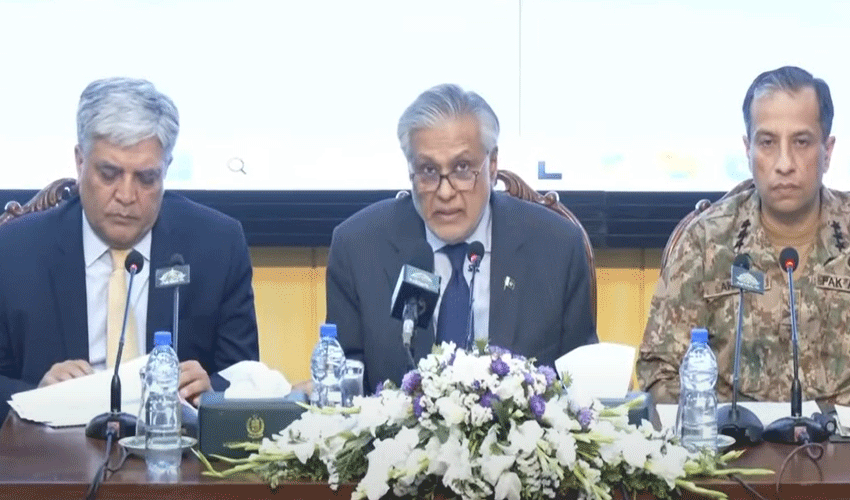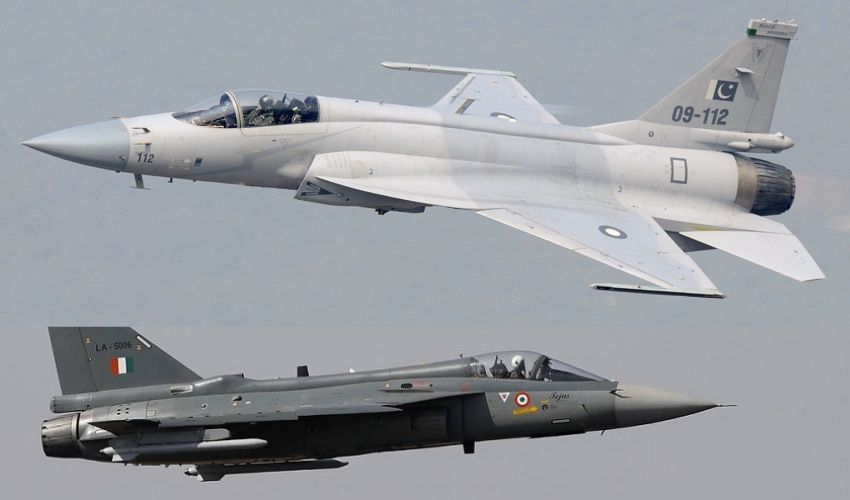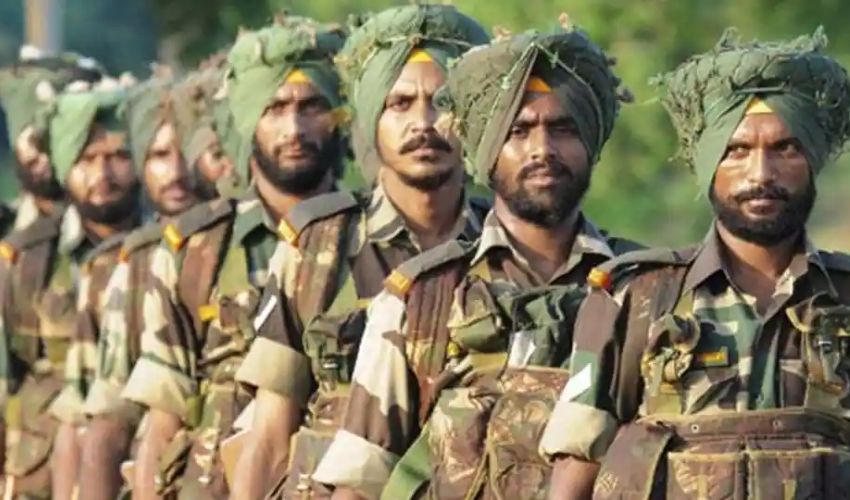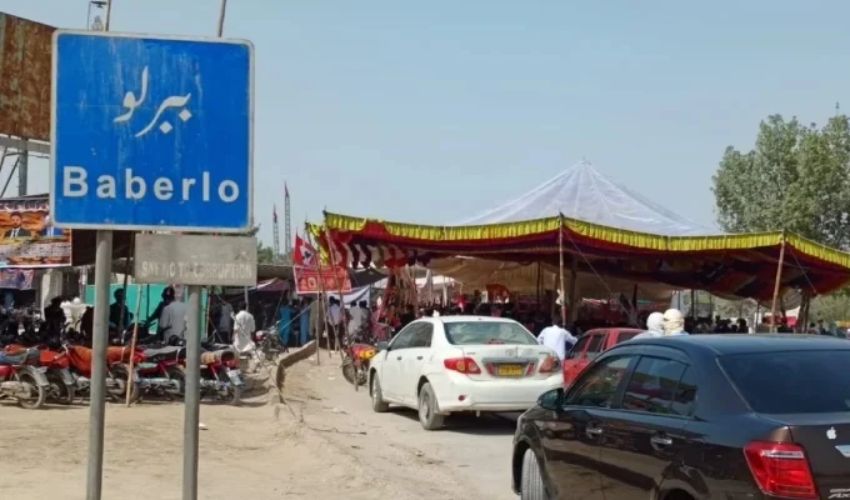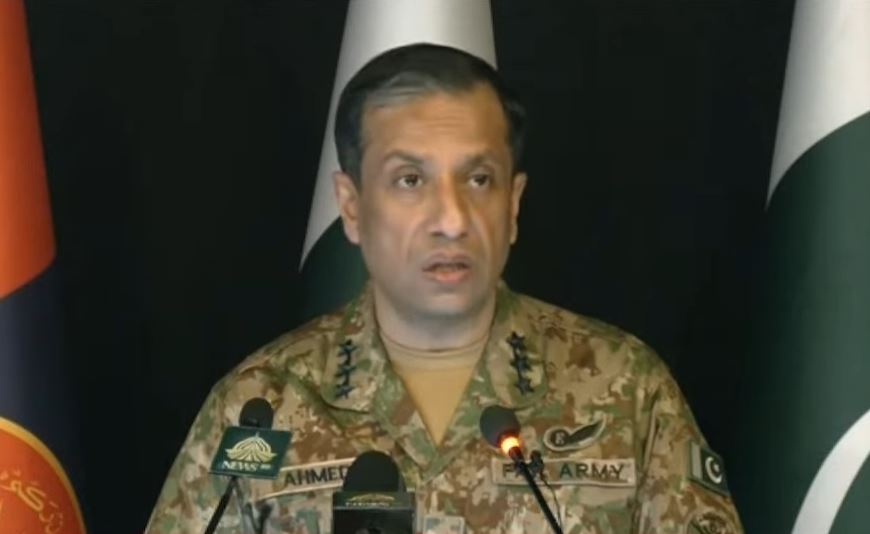Deputy Prime Minister Ishaq Dar alongside Director-General (DG) Inter-Services Public Relations (ISPR) Lieutenant General Ahmed Sharif Chaudhry expressed strong concerns over India’s aggressive stance following the recent terrorist attack in Pahalgam, Indian Illegally Occupied Jammu and Kashmir (IIOJK).
In an urgent press conference on Wednesday, Foreign Minister Ishaq Dar reiterated that Pakistan has no connection to the attack.
"Pakistan condemns terrorism in all its forms and manifestations. No cause or objective can possibly justify taking the lives of innocent people. This is the national policy, and it is also the Islamic policy. The killing of a human being is, according to the Quran, tantamount to the killing of all humanity."
"And saving a life is tantamount to saving all of humanity. We firmly believe in that. Let me say that the targeting of innocent civilians is surely condemnable and deplorable. This is happening in different parts of the world, and we are expressing our views and policies wherever it occurs."
"We have expressed concern over the loss of lives during the Pahalgam attack. We have also extended our condolences, as a victim of terrorism ourselves. No one can feel the pain of those affected like Pakistan."
"As a member of the UN Security Council, Pakistan has constructively engaged with other members on the press statement which was issued by the UN Security Council on the Pahalgam incident in Indian Illegally Occupied Jammu and Kashmir."
"The UN Security Council’s statement contains condemnation in the strongest possible terms of the incident. On the other hand, it is India that glorifies and even celebrates its assassination campaign and its sponsorship of terrorism in Pakistan and other countries."
“We have been working closely with the international community to address this common threat. Since the 22nd of April, the Foreign Office has been actively involved in interacting with the international community. I have been in touch with at least a dozen foreign ministers, deputy prime ministers, and the prime minister, and I have discussed and explained the situation with them.”
“I am sure that, being from the media, you must already be up to date. After each interaction with any dignitary, we make a very brief statement about the interaction. Countless sacrifices have been made by our valiant law enforcement agencies (LEAs) as well as ordinary citizens, which have helped address the threat of terrorism and contributed towards regional and international peace and stability.”
“In fact, Pakistan has been a victim of terrorism that is planned, orchestrated, and sponsored by India. In this backdrop, it is preposterous to even suggest any kind of association of Pakistan with this incident. The hype that is created over each and every incident in India seems deliberate and choreographed.”
“It is unfortunate that India continues to weaponise unsubstantiated accusations and allegations as part of its disinformation strategy for narrow political ends. This is not the first time that India has resorted to such tactics. They have done it before and have resorted again to the same tactics, as they did during the Pulwama incident and earlier ones.”
“In fact, this has now become a very familiar template in diverting attention from India’s inability to suppress the inalienable right of the Kashmiris to self-determination, and its security failures in illegally occupied Jammu and Kashmir, as well as its decades-long state terrorism and oppression.”
“To distract the international community’s attention from the horrors of what’s happening in Indian illegally held Jammu and Kashmir, India deliberately raises tensions with Pakistan.”
“A durable solution for India lies in focusing on its internal problems, instead of pointing fingers at other countries. India has been deploying allegations of terrorism to achieve its strategic objectives for a long time.”
“A case in point is India’s illegal and unilateral actions on the 5th of August 2019, which remind us of the blatant violation of the relevant UN Security Council resolutions and the Fourth Geneva Convention, as well as India’s own commitments.”
“India needs to explain why such incidents usually coincide with high-profile visits. Please make no mistake: the root cause of instability and conflict in South Asia is the unresolved and long-festering Jammu and Kashmir dispute.”
'Terror victim, not perpetrator'
The Deputy Prime Minister lamented the loss of innocent lives in the Pahalgam attack and reiterated Pakistan’s long-standing stance against terrorism.
"Pakistan condemns terrorism in all its forms and manifestations. No cause or objective can justify the killing of innocent people. This is not just our national policy but also our Islamic belief — as per the Holy Quran, killing one human being is like killing all humanity," he said.
Dar reminded the international community that Pakistan has suffered more than any other nation in the fight against terrorism, losing over 80,000 lives and bearing economic losses of over $150 billion, with the total impact exceeding $500 billion.
“No one understands the pain of terrorism more than Pakistan,” he said. “It is preposterous to even suggest that Pakistan was involved in the Pahalgam attack, given its own sacrifices and continued efforts to curb terrorism.”
'India using old template'
Dar accused India of following a "familiar template" seen previously during the Pulwama incident in 2019, wherein New Delhi blamed Pakistan without credible evidence, triggering a brief but dangerous military stand-off.
He said India often uses such incidents to stir domestic political sentiment, deflect attention from internal issues, and justify oppressive measures in IIOJK. “The current episode is no different,” he said.
He further alleged that incidents like the Pahalgam attack tend to coincide with high-profile international visits or diplomatic engagements in India, suggesting an attempt to divert global attention from ongoing human rights abuses in occupied Kashmir.
“The root cause of instability in South Asia is the unresolved Jammu and Kashmir dispute,” Dar stressed. “India’s illegal occupation and its consistent defiance of UN Security Council resolutions remain a grave concern for the international community.”
He added that India’s internal policies, including the enactment of draconian laws in IIOJK and rising Islamophobia, are contributing to further alienation and unrest within its borders.
This is a developing story...





